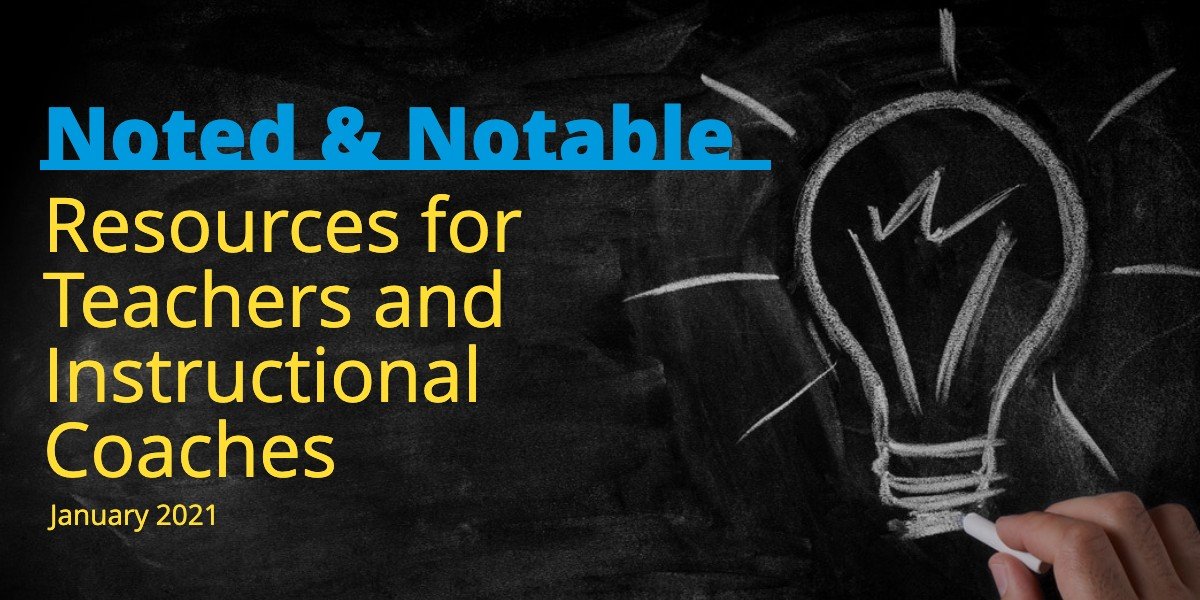Resources For Teachers and Instructional Coaches – January 2021

Start off the new year with these recommended reads for teachers and instructional coaches.
Teachers seeking areas of improvement should create a routine around self-reflection
Teachers who take time daily to reflect on what is working in class and what is not can better assess areas for improvement and make the necessary adjustments.
Take time to block out the current uncertainties of the world and reflect on what you have control over: your teaching practice. Keeping a reflective journal is a great way to begin this work. Developing a journaling practice is not a novel idea. However, this activity will help you build resilience, an essential mindset given the current teaching landscape.
Taking a cue from the practice of mindfulness, reflecting on your daily practice allows you to pay attention to the present moment and will help keep feelings of overwhelm at bay. Journaling will also help give you a better understanding of where to focus your efforts for improvement.
Starting with one lesson, consider questions such as the following:
- In terms of student learning, what really worked during this lesson? What didn’t?
- What proves that students actually learned?
- What teaching skills did I use to promote learning?
- Was there a moment in which I really connected with a student?
Read more on Edutopia: The Benefits of Developing a Reflective Routine
Peer-based learning, structured learning environments, and team-based competition are all strategic learning principles that are here to stay
Hybrid and virtual classrooms, and personalized and project-based learning used to be considered “alternative” methods of education. Here are five learning strategies that have been honed during the pandemic, and are not going away any time soon.
When we began our residential summer learning program in 2004, we wrapped our curriculum around a “team model” that reflects the collaborative way that the world works. We minimized the “sage on the stage” instructional model where lecture dominates learning time, and intentionally built our traditional classes around small group learning structures.
In an online environment, we have seen benefits from that early design thinking in terms of helping adapt our students and curriculum in an online format, and creating capacity for instructors to balance interaction with large classes and smaller groups. We’ve also noticed an increased need in the virtual environment for tech that enhances students ability to provide feedback to each other, engage in dialogue and work toward goals while in these groups, which look a lot like the teams in our work world.
We believe more strongly than ever that small-group learning which incorporates and builds on expanding tech platforms will better prepare students for higher learning and work in the years to come.
Read more on EdSurge: The Lessons Learned Online That Will Shape Education After the Pandemic
5 strategies to consider when building an effective early childhood educator workforce
Expanding job coaching, supporting career advancement, and optimizing project-based training are three of the five strategies suggested in a group report by the National Head Start Association, The HeadStarter Network and Bellwether Education Partners.
Redefine credentials. The report suggests the creation of a national repository for Child Development Associate training options. A CDA is an entry-level credential for beginning early educators. It is also recommended that a second credential be established that adds to the CDA and shows educators have advanced levels of understanding across different subject areas. That advanced credential would be viewed equal to a four-year post secondary degree.
Rethink degree attainment. This recommendation would create an online Premier University for early educators, which would consolidate components of early education preparation that currently exist separate from one another. The imagined university would have faculty with experience in culturally responsive instruction.
Optimize project-based training. A major aim of this goal would be to compensate early childhood educators during their pre-service preparation work, similar to apprenticeships in various career fields. The U.S. Department of Labor recently approved early childhood education as an apprenticeable occupation, which can open the door for financial aid to cover educational costs and flexibility in practice-based training.
Read more on EducationDive: 5 Strategies To Reform Early Ed Professional Development

